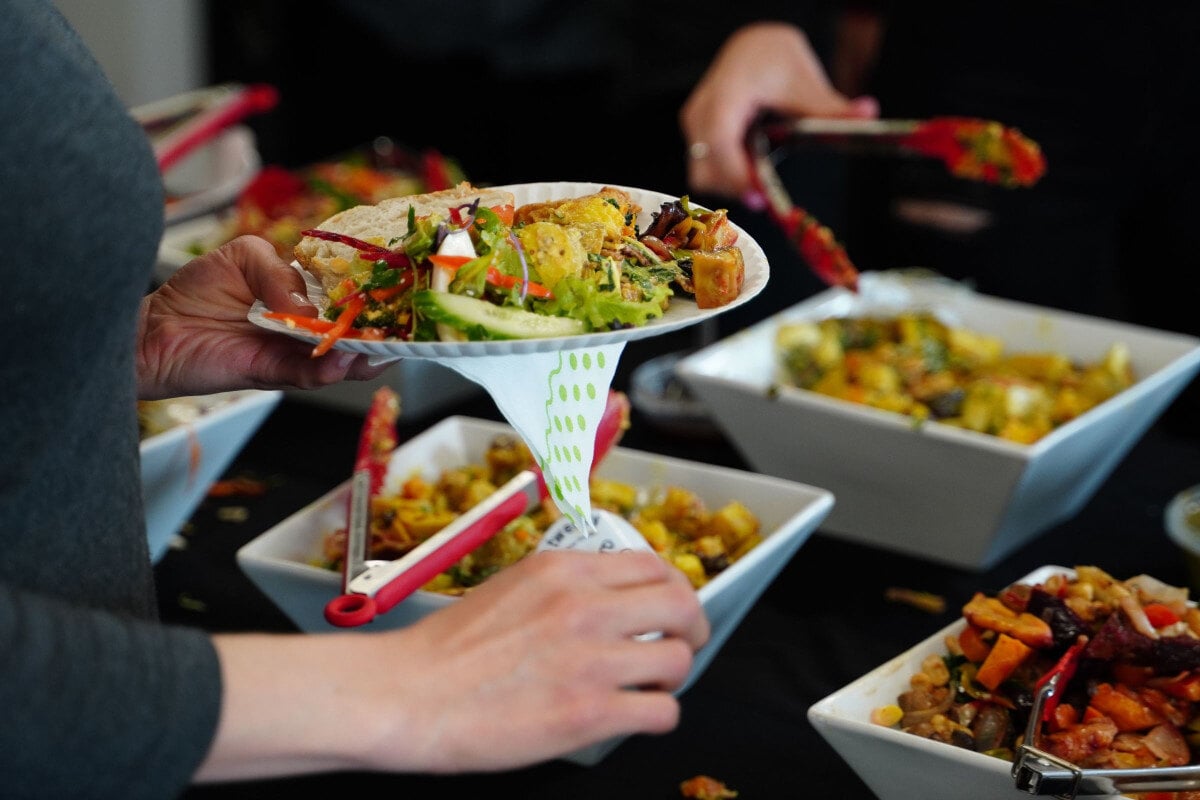How Does Inflation Affect Consumers? 4 Facts to Know
Inflation directly impacts how consumers spend, save, and make purchasing decisions. For restaurant and convenience store owners, this means adapting...
Platform
Combining online ordering, loyalty, omnichannel messaging, AI insights, and payments in one platform. Paytronix delivers relevant, personal experiences, at scale, that help improve your entire digital marketing funnel by creating amazing frictionless experiences.
A Complete Customer Experience Platform
Online Ordering
Acquire new customers and capture valuable data with industry leading customization features.
Loyalty
Encourage more visits and higher spend with personalized promotions based on individual activity and preferences.
Catering
Grow your revenue, streamline operations, and expand your audience with a suite of catering tools.
CRM
Build great customer relationships with relevant personal omnichannel campaigns delivered at scale.
Artificial Intelligence
Leverage the most data from the most customer transactions to power 1:1 marketing campaigns and drive revenue.
Payments
Drive brand engagement by providing fast, frictionless guest payments.
Solutions
We use data, customer experience expertise, and technology to solve everyday restaurant and convenience store challenges.
Contactless Experiences
Accommodate your guests' changing preferences by providing safe, efficient service whether dining-in or taking out.
Customer Insights
Collect guest data and analyze behaviors to develop powerful targeted campaigns that produce amazing results.
Marketing Automation
Create and test campaigns across channels and segments to drive loyalty, incremental visits, and additional revenue.
Mobile Experiences
Provide convenient access to your brand, menus and loyalty program to drive retention with a branded or custom app.
Subscriptions
Create a frictionless, fun way to reward your most loyal customers for frequent visits and purchases while normalizing revenues.
Employee Dining
Attract and retain your employees with dollar value or percentage-based incentives and tiered benefits.
Order Experience Builder
Create powerful interactive, and appealing online menus that attract and acquire new customers simply and easily.
Loyalty Programs
High-impact customizable programs that increase spend, visit, and engagement with your brand.
Online Ordering
Maximize first-party digital sales with an exceptional guest experience.
Integrations
Launch your programs with more than 450 existing integrations.
Loyalty Programs
Deliver the same care you do in person with all your digital engagements.
Online Ordering
Drive more first-party orders and make it easy for your crew.
Loyalty Programs
Digital transformations start here - get to know your guests.
Online Ordering
Add a whole new sales channel to grow your business - digital ordering is in your future.
Integrations
We work with your environment - check it out.
Company
We are here to help clients build their businesses by delivering amazing experiences for their guests.
Meet The Team
Our exceptional customer engagement innovations are delivered by a team of extraordinary people.
News/Press
A collection of press and media about our innovations, customers, and people.
Events
A schedule of upcoming tradeshows, conferences, and events that we will participate in.
Careers
Support
Paytronix Login
Order & Delivery Login
Resources
Learn how to create great customer experiences with our free eBooks, webinars, articles, case studies, and customer interviews.
FlightPaths are structured Paytronix software onboarding journeys designed to simplify implementation and deliver maximum ROI.
See Our Product In Action
E-Books
Learn more about topics important to the restaurant and c-store customer experience.
Reports
See how your brand stacks up against industry benchmarks, analysis, and research.
Blog
Catch up with our team of in-house experts for quick articles to help your business.
Case Studies
Learn how brands have used the Paytronix platform to increase revenue and engage with guests.
Have you overlooked any of these 16 crucial steps for your catering business?
10 min read
Nov 04, 2024

Did you know restaurants that provide personalized service and convenient tech see higher repeat visits? For instance, 55% of diners value being recognized at restaurants. Additionally, 25% prefer returning to venues with tech-enhanced ordering.
This highlights the success of your catering business, which relies on the quality of service your catering staff provides to customers.
Scaling your operations is no small feat, but having the right staff makes all the difference. On the other hand, the wrong employees may bring a harmful work ethic into your workplace, make mistakes, or even ruin your brand reputation.
So, whether you're gearing up for a major event or looking to streamline your daily catering operations, hiring the right people is a must.
Let’s explore the key roles and skills you need from catering staff to grow your business.
The global catering services market is growing at a rate of 4.5% each year and is expected to reach $908.8 billion by 2033 (GlobeNewswire). The demand for quality catering services is increasing, and you must focus on building a skilled team and improving your services to get a competitive edge. The four key catering staff roles and responsibilities essential to handle the operations effectively are:
1. Event Managers
Event managers develop detailed plans addressing every aspect of your catering clients’ events, including objectives, budget, timeline, and guest dietary needs or preferences. They collaborate closely with clients, vendors, and the rest of your catering team to organize your resources to meet high service standards. In addition, event managers provide assistance to the guests throughout the event to give everyone involved a positive experience.
2. Chefs and Cooks
Chefs and cooks oversee all food preparation at catering events. They work closely with managers and event planners to create menus and ensure all dishes exceed customers’ expectations. The cooks follow the instructions provided by the chefs and work efficiently to keep up with the kitchen demands.
3. Servers and Bartenders
Servers deliver food and beverages to guests, while bartenders manage bar service and prepare drinks. Both interact directly with the customers and create a welcoming atmosphere to encourage repeat business. A robust team of servers and bartenders is crucial for the utmost customer satisfaction.
4. Setup and Cleanup Staff
The support staff arranges tables, sets up buffet stations, and cleans up the venue before the guests arrive. They also maintain the serving stations and restock food and drinks throughout the event. The support staff also reports any unsafe conditions or accidents to the manager during the event. The staff's attention to detail helps managers create a smooth experience for everyone throughout the event.
Hiring your catering team is more than filling positions; it’s about understanding your unique staffing needs, fine-tuning your hiring process, and conducting thorough interviews. Follow these three steps to find the perfect catering team:
1. Identify Your Hiring Needs
Start by determining which positions you need to hire for in general. Assess the events currently on your business calendar and any operational changes you plan to make and compare them with your current team.
It will give you a clear idea of what positions you need to fill based on upcoming event needs. You should approach this process by:
2. Recruit Qualified Catering Team Candidates
The quality of service your catering team offers directly impacts your brand’s reputation. Make sure all your staff members are qualified and highly trained to manage complex conditions. You should hire the right staff from:
3. Interview Process for Catering Staff
Hire the right employee each time by asking thoughtful interview questions and by evaluating candidates' skills closely. This structured approach will help you assess their compatibility with your team. Here's how you interview a new hire for your catering business:
New staff take time to get used to your business’s culture. Provide training sessions to new hires so they should more smoothly adapt to the technology and methods your catering business encompasses. Here are five key focus areas of training and development sessions to improve new staff skills:
1. Introduce Service Standards to the New Hires
Training and development sessions familiarize new staff with service standards like maintaining a positive attitude, focusing on every detail, being punctual, and guiding co-workers to deal with guests effectively.
2. Provide Menu Knowledge
Make sure your new hires have a strong understanding of your menu items and catering equipment. It’s important all catering staff members, not the cooks or chefs, know what's in the arsenal. This way, your staff should confidently interact with the guests and manage minor issues without supervision.
3. Event Setup and Execution
Training sessions cover everything about event preparation, including setting up tables, arranging decor, attractively presenting food, and organizing buffet plates and cocktail arrangements. Familiarizing your new staff with the event setup process helps employees fulfill each element of you.
4. Communicating Effectively with Guests
Your training sessions should also focus on improving the communication skills of your staff. Teach them your standard ways of greeting guests, addressing their concerns, and listening patiently to them. This will foster a positive customer experience and increase your chance of repeat business.
5. Handling Unexpected Challenges Effectively
Last-minute changes and unexpected issues are common in the catering business. Training sessions should prepare staff to remain adaptable under pressure situations such as staff shortages, managing food supply issues, or dealing with demanding clients.
Hiring employees is easier than retaining them. Studies show about 63% of adults worked in food service, while only 48% held their first regular job in this sector (National Restaurant Association).
Additionally, the hospitality industry faces an annual turnover rate of 73.8%, with over 6% of staff leaving each month (The Bureau of Labor). This leads to the loss of valuable trained staff and requires businesses to invest more time and energy into onboarding new team members. Here are five strategies for improving employee retention in your catering business:
1. Listen to and Implement Employee Feedback
Organize regular meetings with your employees to ask their opinions regarding event planning. It will make your employees feel valued and give you a wider range of unique catering event management ideas.
2. Recognize and Value Their Efforts
A study found businesses with employee recognition and appreciation programs experience 56% lower staff turnover. Giving your employees awards or shoutouts during meetings makes them feel appreciated. Consider whether any operational or bureaucratic obstacles stand in the way of appreciating your staff on a regular, public basis and remove them.
3. Offer Competitive Compensation and Benefits
Give your employees competitive wages and other benefits, such as strong health insurance plans, paid time off, and maternity or paternity leave. Keep yourself updated with the catering industry’s standards so skilled workers are incentivized to work for your company.
4. Avoid Employee Overload
72% of corporate events and 80% of weddings are booked 3 to 12 months in advance. It is reported around 42% of catering companies are understaffed (Nuphoriq). Thus, approximately 45% of operators require additional employees to fulfill customer demand (National Restaurant Association). To address this, consider hiring additional staff to alleviate the workload that your full-time employees face.
5. Invest in Your Staff’s Professional Growth
Growth-driven employees prefer to stay with businesses where they learn something new often and don’t feel stuck at the same level. Offer training programs in culinary skills, customer service, and event management. If possible, you should also conduct special seminar classes with industry-leading hosts to motivate your staff.
Catering businesses face staffing challenges like finding the right employees and maintaining employee motivation and engagement. Addressing all these hurdles helps businesses thrive in the workforce. Here are five of the challenges catering businesses face and the solutions to overcome them:
1. Finding Qualified Candidates
Finding qualified candidates with the necessary skills and experience to thrive under pressure is time-consuming. Work on your recruitment strategies and utilize social media, job portals, and local culinary schools to find high-caliber candidates.
2. High Turnover Rates
The food service and accommodation sector experiences an average turnover rate of 74.9% (Worldmetrics), compared to the average overall employee turnover rate of 3.52%. Such a high turnover rate disrupts service consistency and increases training costs. To resolve this, focus on implementing retention strategies like competitive compensation and addressing employee issues promptly for professional development and career progression.
3. Skills Gap
Managing complex event operations requires skilled staff with both technical know-how and people and communication skills. When new hires lack these skills, it leads to a shortage of qualified staff. To bridge this gap, invest in comprehensive training programs to train new hires to become industry leaders.
4. Wage Inflation
Evaluate your pay structure regularly to ensure your employees get attractive packages and additional perks by working with you. Include performance bonuses, health insurance, and skill development stipend plans to alleviate the pressure of rising living costs consumers are increasingly experiencing.
5. Evolving Technology
Some catering staff members may find it difficult to get used to a brand-new tech stack. Don’t introduce new tech suddenly to your team. Provide training programs and designate a final date to shift from your old system to the new one. It'll help your staff adapt to new technological innovations without getting overwhelmed.
The importance of catering team dress code at major events cannot be overstated. It’s not about mere appearance; a properly dressed catering team reflects a positive brand image and promotes a professional and more substantial business presence. Here are the benefits of implementing a dress code in the catering industry.
Creating an effective dress code for your catering team tailored to different events leaves a lasting impression on your guests. Here are eight tips to help you set up an appropriate dress code for your teams for different types of events:
1. Understand the Event Type
Every event requires different attire for your staff. A formal wedding may require an elegant dress code, while an outdoor picnic might allow for more casual options. Therefore, assess each event venue, theme, and client preference to ensure your staff presents in appropriate attire.
2. Define Dress Code Categories
You should have different dress codes for every event. For example, you should consider black-tie attire with tuxedos for formal events, cocktail attire for semi-formal events, and a business casual look like polo t-shirts for casual events.
3. Incorporate Brand Identity
Incorporate uniforms with brand colors and logos to create a cohesive look reinforcing recognition. Also, pay attention to cultural norms and local dress styles to show respect for the event and guests while still highlighting your brand identity.
4. Consider Comfort and Functionality
Catering staff work long hours during events, so it's essential to choose breathable fabrics for their attire to keep them comfortable and professional. Incorporate pockets to allow staff to carry necessary tools and utensils easily. Moreover, ensure the attire reflects your catering business's brand image and complements the event’s theme.
5. Provide Guidelines for Accessories
Detail acceptable accessories like ties, shoes, and stud earrings to complement your staff's attire without distracting the overall presentation. Avoid overly flashy items to maintain a cohesive, professional catering staff dress code.
6. Set Hygiene and Grooming Standards
Set clear grooming and hygiene standards for your staff members. Decide on hairstyle standards for both men and women, well-trimmed beard, well-ironed uniforms, clean nails, and generally professional appearance to ensure your team members have an acceptable image.
7. Prepare for Seasonal Changes
Consider seasonal variations in your dress code, such as lighter fabrics and short sleeves for summer events and jackets or overcoats for winter events. Prioritize the staff members' comfort so they should perform their duties more effectively.
8. Review and Adapt the Dress Code Regularly
Gather feedback from your team on a regular basis and be open to making adjustments based on your staff's concerns. Being adaptive to your staff's needs will boost dedication and team morale.
Operating a successful catering business involves adhering to employment laws and health code requirements to ensure a safe working environment. Therefore, businesses should focus on legal considerations to protect the employer and employees' rights. It includes:
In addition to this, your staff must adhere to food safety and workplace safety regulations such as:
The quality of your catering business services directly impacts your customer base and helps drive growth. Small or large, always have a catering business plan ready and invest in strategic staffing solutions to improve overall operations.
Use tech solutions like online ordering and booking systems and loyalty programs to boost your order frequency by 18% and maintain a strong brand reputation. Get a free demo from our team to scale your catering business to new heights.

Inflation directly impacts how consumers spend, save, and make purchasing decisions. For restaurant and convenience store owners, this means adapting...

Restaurants have had their fair share of ups and downs, and it’s no surprise that 2025 brings new challenges. Rising food costs, supply chain issues,...

Managing restaurant staff goes beyond scheduling and filling open roles. It’s about building a team that works well together. Every person plays a...